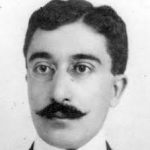Cavafy was born in 1863 in Alexandria, Egypt, to Greek parents, and was baptized into the Greek Orthodox Church. His father was a prosperous importer-exporter who had lived in England in earlier years and acquired British nationality. After his father died in 1870, Cavafy and his family settled, for a while, in Liverpool, UK. Cavafy moved back to Alexandria in 1877, after the family faced financial problems in the crash of 1876.
Disturbances in Alexandria in 1882 caused the family again temporarily to move, this time to Constantinople. When a revolt against Anglo-French control of Egypt broke out in Alexandria precipating the 1882 Anglo-Egyptian War, Alexandria was bombarded by an English fleet and the family apartment at Ramli was burned. In 1885, Cavafy returned to Alexandria, where he lived for the rest of his life. He worked first as a journalist, then for the British-run Egyptian Ministry of Public Works for thirty years. (Egypt was a British protectorate until 1926.) From 1891 to 1904 he published his poetry in broadsheet form, only for his close friends, receiving whatever acclaim mainly within the Greek community in Alexandria. He was introduced to mainland-Greek literary circles through a favourable review by Xenopoulos in 1903, but got little recognition, his style being very different from then-mainstream Greek poetry. Only 20 years later, after the Greek defeat in the Greco-Turkish War (1919-1922), a new generation of almost nihilist poets (e.g. Karyotakis) would find inspiration in Cavafy's work. He died of cancer of the larynx on April 29, 1933, his 70th birthday.
A biographical note written by Cavafy reads as follows:
"I am from Constantinople by descent, but I was born in Alexandria—at a house on Seriph Street; I left very young, and spent much of my childhood in England. Subsequently I visited this country as an adult, but for a short period of time. I have also lived in France. During my adolescence I lived over two years in Constantinople. It has been many years since I last visited Greece. My last employment was as a clerk at a government office under the Ministry of Public Works of Egypt. I know English, French, and a little Italian."
It is generally accepted that Cavafy was homosexual and gay themes appear in a number of his poems.
Since his death, Cavafy's reputation has grown. He is now considered one of the finest modern Greek poets. His poetry is now taught at schools in mainland Greece and throughout the world in Universities.
In 1996 Yannis Smaragdis made a movie about his life. Unfortunately this film is only available in Greece in a non subtitled version.
Work
The manuscript of the poem "Keriá" (Κεριά)
manuscript for his poem "That's The Man" (Outos Ekeinos) - 1909Cavafy has been instrumental in the revival and recognition of Greek poetry both at home and abroad. His poems are, typically, concise but intimate evocations of real or literary figures and milieux that have played a role in Greek culture. Uncertainty about the future, sensual pleasures, the moral character and psychology of individuals, homosexuality, and a fatalistic existential nostalgia are some of the defining themes.
Besides his subjects, unconventional for the time, his poems also exhibit a skilled and versatile craftsmanship, which is almost completely lost in translation. Cavafy was a perfectionist, obsessively refining every single line of his poetry. His mature style was a free iambic form, free in the sense that verses rarely rhyme and are usually from 10 to 17 syllables. In his poems, the presence of rhyme usually implies irony.
Cavafy drew his themes from personal experience, along with an enormous knowledge of history, especially of the Hellenistic era. Many of his poems are either pseudo-historical, or seemingly historical, or accurately, but quirkily, historical.
One of Cavafy's most important works is his 1904 poem "Waiting for the Barbarians". This work, in the person of a disingenuous Byzantine narrator, cynically explores the view that cultivating fear of an invisible external enemy usually serves internal purposes. Parallels have been drawn between the poem's message and the war on terror.[2] In 1911, he wrote Ithaca, inspired by the Homeric return journey of Odysseus to his home island, as depicted in the Odyssey. The poem's theme is that the enjoyment of the journey of life, and the increasing maturity of the soul as that journey continues, is all the traveler can ask.
Cavafy divides his own work into three categories:
Historical poems
These poems are mainly inspired by the Hellenistic era with Alexandria at primary focus. Other poems originate from Helleno-romaic antiquity and the Byzantine era. Mythological references are also present. The periods chosen are mostly of decline and decadence (eg Trojans); his heroes facing the final end.
Sensual poems
The sensual poems are filled with lyricism and emotion; inspired by recollection and remembrance. The past and former actions, sometimes along with the vision for the future consist the muse of Cavafy in writing these poems.
Philosophical poems
Also called instructive poems they are divided into poems with consultations to poets and poems that deal with other situations such as closure (for example, "The walls"), debt (for example, "Thermopylae"), and human dignity (for example, "The God Abandons Antony").
Source: Wikipedia
Constantine Cavafy
InternationalUpcoming Events

Arabia Felix - Alarabia Alsaida in Bayt Yakan
April 15, 2025
Arabia Felix by Thorkild Hansen, and translated by...

A writer, a vision, a journey: a conversation with Professor Ilan Pappe
March 15, 2025
This event took place on 15 March, 2025 . You may...

مسافر يبحث عن ماء
February 17, 2025
تقيم نقابة اتحاد كتاب مصرشعبة أدب الرحلات تحت رعاي...

Online discussion of The Vegetarian by Han Kang Nobel Prize winner 2024
November 08, 2024
This discussion of Han Kang’s The Vegetarian...
